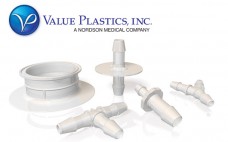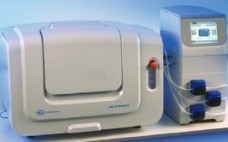Supplemental Tables The authors compiled a list of key cell therapy bioprocessing technologies through expert-user interviews; reviews of trade and industry literature; and discussions with technology manufacturers. Then they obtained technical specifications from publicly available documents and (whenever possible) confirmed them with the technology manufacturers to ensure their accuracy. Here are their results! Due to the size of the table structure, we were unable to print these results within our Cell Therapy Supplement, in March 2014. We instead have posted…
Saturday, March 1, 2014 Daily Archives
Analytics for Modern Bioprocess Development
This podcast features: Mirabel Rios
Novel Excipients Prevent Aggregation in Manufacturing and Formulation of Protein and Peptide Therapeutics
This podcast features: Ed Maggio
The Importance of a One-Stop-Shop-6 Questions to Ask Your Fluid Management Component Supplier
A one-stop-shop fluid management component supplier assures quality, streamlines processes, and limits costs. To be certain you receive the preeminent and safest single-use component, take time to evaluate your fluid-management supplier or a supplier under consideration by asking the 6 important questions we pose in this whitepaper. Your supplier’s answers will help determine if the company is a steadfast partner and one-stop-shop committed to helping you pass FDA validation. You also will learn your supplier’s willingness to provide: the best…
Activatable Immunoconjugates for Target Cancer-Cell–Specific Diagnosis and Therapy
In cancer treatment, early diagnosis and targeted therapies are assumed to yield the highest cure rates. However, most current methods are limited by their low sensitivity to early disease and a lack of specificity for targeted cell killing. Newly developed, activatable immunoconjugates assist in the accurate detection of cancer through in vivo imaging with high target-to-background contrast (1,2). They also provide for the possibility of highly specific, light-mediated treatment with minimal effects on healthy cells surrounding tumors (3). In fact,…
Assessing Flange Strength and Dimensional Variability
Plastic syringes are viable alternatives to glass syringes in the biopharmaceutical market. They have two main advantages over glass syringes: their break resistance (specifically on the finger flange) and their ability to maintain tighter dimensional tolerances and less variability (because of the flexible molding process). Both attributes are critical when a 1-mL long prefilled syringe is used with an autoinjector device. The high break resistance of plastic syringes can reduce the number of rejected units during a fill–finish process. And…
Effective Cryopreservation and Recovery of Human Regulatory T Cells
The list of conditions being targeted by cell therapies is rapidly growing, but commercializing cells for widespread medical use will require standardized laboratory practices. Development processes must be adapted specifically for cell-based drug products. Regulatory T-cell therapy represents a promising new frontier in the immunotherapy of autoimmune disorders, especially for patients who have been refractory to available treatments. Because of intrinsic fragility, cell therapy products can be highly sensitive to variations in manufacturing procedures. Standardization of drug-product cryopreservation and storage…
Single-Use Bioreactors and Microcarriers
Cell-based therapies hold promise for treating many acute and chronic diseases (1). Optimism surrounding that therapeutic potential has driven the initiation of multiple clinical trials in pursuit of such treatments. Procedures for preparing these therapeutic agents begin with selective isolation of cells from desired tissues. That is followed by ex vivo expansion of cells of desired phenotype and functionality. Once expanded to acceptable levels, cells are stored to preserve their viability during transportation to treatment facilities. The final step in…
Single-Use, Continuous Processing of Primary Stem Cells
Many potentially therapeutic products involve the culture of stem cells. Their commercial success depends on the development of scalable good manufacturing practice (GMP) technologies that can both robustly and cost-effectively produce very large numbers of cells. Through many improvements and innovations in bioprocessing operations over the years, fed-batch suspension culture has remained the most common mode for large-scale biopharmaceutical manufacturing. However, some recent events suggest that may be changing (1,2). For the culture and expansion of stem cells, large-format adherent…
Accelerating Purification Process Development of an Early Phase MAb with High-Throughput Automation
Monoclonal antibodies (MAbs) are the fastest growing segment in the biopharmaceutical industry because they are potentially efficacious in the treatment of diseases such as cancer and autoimmune disorders (1,2). With steadily increasing demand for efficient and affordable therapies, speed to clinic/market is important, and biopharmaceutical companies push multiple drugs into development each year to ensure business sustainability (3,4,5,6). Downstream purification process development for therapeutic MAbs is a critical step on their path to reach clinical trials and beyond…


